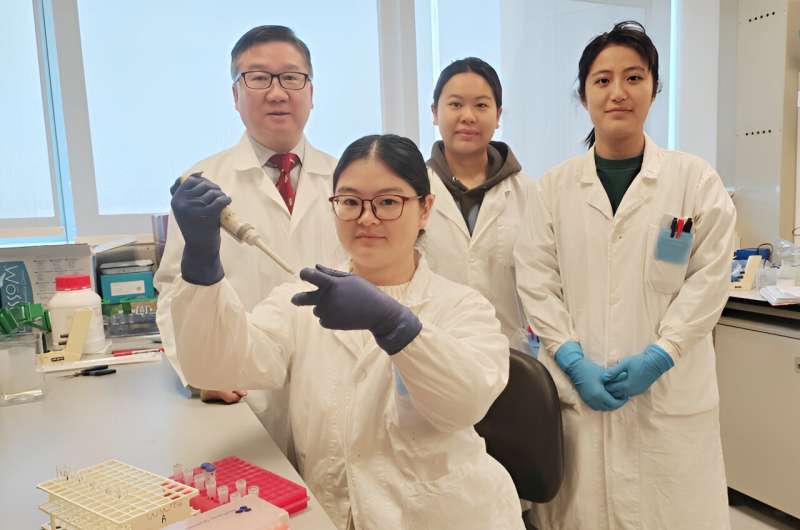This article has been reviewed according to Science X's editorial process and policies. Editors have highlighted the following attributes while ensuring the content's credibility:
fact-checked
trusted source
proofread
Researchers develop dual anti-tumor vaccine

A research team at the LKS Faculty of Medicine, the University of Hong Kong (HKUMed), has discovered that exosomes derived from γδ-T cells not only have direct anti-tumor effects but also, when developed into a tumor vaccine, can effectively induce a tumor-specific immune response. The findings, which provide a new approach to cancer treatment, were published in the Journal of Extracellular Vesicles.
Exosomes are nanoscale particles secreted by cells, carrying various substances, such as lipids, proteins and nucleic acids, that play a crucial role in intercellular communication. Exosomes have been explored for developing tumor vaccines, as they can protect vaccine components from degradation, improve stability, extend the biological half-life, and enhance antigen uptake by antigen-presenting cells (APCs).
Previous studies focused on exosomes derived from tumor cells (TExos) and dendritic cells (DC-Exos) but found limitations in terms of safety and clinical efficacy.
In this study, the research team focused on exosomes derived from human γδ-T cells, a rare subset of T cells known for their direct anti-tumor activity and ability to enhance T-cell responses.
The research team discovered that γδ-T cell-derived exosomes (γδ-T-Exos) exhibited dual anti-tumor activities by carrying cytotoxic and immunostimulatory molecules that can directly kill tumor cells and stimulate the immune system.
They found that γδ-T-Exos has adjuvant effects, enhancing the expression of antigen-presenting and releasing molecules that promote inflammation, which improves the ability of the immune system to recognize and attack tumor cells.
Developing tumor vaccines by loading γδ-T-Exos with tumor-associated antigens proved more effective in promoting tumor-specific T-cell responses than using γδ-T-Exos alone. The vaccine strategy also retained direct anti-tumor effects and induced tumor cell death.
Intriguingly, the research showed that vaccines based on allogeneic γδ-T-Exos (derived from different individuals) exhibited similar preventive and therapeutic effects as vaccines based on autologous γδ-T-Exos (derived from the same individual) in mouse models. This suggests that this approach is suitable for centralized and standardized production. The vaccines have dual anti-tumor capabilities in effectively killing tumor cells and indirectly inducing a T-cell-mediated anti-tumor immune response, leading to better tumor control than existing vaccine strategies.
Professor Tu Wenwei, from the Department of Pediatrics and Adolescent Medicine, School of Clinical Medicine at HKUMed, who led the research, stated, "Our study revealed for the first time the adjuvant effects of γδ-T-Exos and its ability to effectively induce tumor-specific T-cell responses when used in tumor vaccines. In multiple mouse models, γδ-T-Exos-based vaccines effectively controlled tumor development and progression."
"More importantly, allogeneic γδ-T-Exos-based vaccines had similar anti-tumor effects as autologous γδ-T-Exos-based vaccines. Therefore, γδ-T-Exos derived from healthy donors can be used to treat allogeneic tumor patients, which greatly facilitates the clinical promotion and application of this new therapy."
The findings of the study have significant implications for cancer immunotherapy. The adjuvant effects observed in γδ-T-Exos highlight their potential for cancer vaccines, as they can effectively deliver tumor antigens. They have dual anti-tumor effects, surpassing the efficacy of DC-Exos-based vaccines.
Additionally, allogeneic γδ-T-Exos-based vaccines show promise for clinical practice, as they simplify the personalized preparation process and allow standardized production. These findings have the potential to improve cancer treatment outcomes by offering a more streamlined and accessible approach.
More information: Xiwei Wang et al, Tumor vaccine based on extracellular vesicles derived from γδ‐T cells exerts dual antitumor activities, Journal of Extracellular Vesicles (2023). DOI: 10.1002/jev2.12360

















